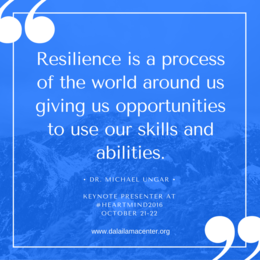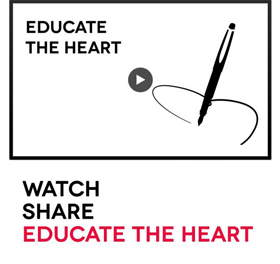Heart-Mind 2016 In Profile: Michael Ungar


Dr. Michael Ungar is a professor, therapist, writer and, as Canada Research Chair in Child, Family, and Community Resilience, he is one of the top researchers on the topic of resilience in the world. His work has revolutionized the way we now understand resilience and has helped pinpoint the important factors that influence resilience during stress periods. Michael’s presentation at Heart-Mind 2016, Nurturing Resilience: Nine Things Children Need from their Parents, Schools and Communities, will provide practical strategies for parents and educators to help young people heal, and it is based on material from his book, I Still Love You.
Below, Dr. Ungar answers three questions about resilience and how it became the focus of his research.
What are some of the most common misunderstandings about Resilience?
"Often, we think that resilience is something inside of us. An inner quality. But in fact very little of our success under adversity has to do with internal factors alone. Resilience is a process of the world around us giving us opportunities to use our skills and abilities. It has just as much, and maybe even more, to do with what we have outside as what we have inside. Plant us in a rich supportive environment and most people can experience incredible amounts of trauma and still cope well because of the supports they receive."
 Why have you chosen Resilience as the central focus of your work?
Why have you chosen Resilience as the central focus of your work?
"I met some amazing young people along the way in my career. People who showed me that suppressing disorder is not enough. We need to think about “what’s next” after we remove problems. These young people showed me that what is truly healing is the opportunities they receive to do well, to attach, to realize their potential, to feel safe and treated fairly. When my work shifted to resilience I found myself far less burned out by the barrage of complex problems facing my clients. I became inspired by what they had accomplished despite the odds stacked against them, and the richness of the environments around them that I had often overlooked. On a more personal note as well, and as I describe in my book, I Still Love You, I emancipated from my parents at 16 so had my own resilience to consider as well. I was curious why I did okay when others do not. The answer took me in new directions and around the world."
What is the number one piece of advice you would give to parents to best develop resilience in their children?
"Provide children with manageable amounts of age-appropriate challenges and risks. Let them fail in ways that they can fix. Give them the opportunities they need to develop all the qualities they’ll need to immunize themselves against future problems that are inevitable in life."
Join us at Heart-Mind 2016 and be inspired by Dr. Michael Ungar as he provides us with expert advice and practical strategies on how to cultivate resilience in the children and youth in our lives. Dr. Ungar will be delivering the conference's opening address on Friday, October 21st, as well as hosting a Big Conversation/Small Group session in the afternoon of Saturday, October 21st.
Check out the profiles of other Heart-Mind 2016 keynote presenters:
by Jordan Lee and David Samis






Comments
Post new comment